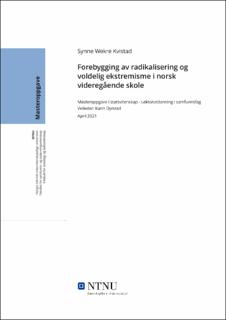| dc.contributor.advisor | Dyrstad, Karin | |
| dc.contributor.author | Kvistad, Synne Wekre | |
| dc.date.accessioned | 2021-09-28T17:33:23Z | |
| dc.date.available | 2021-09-28T17:33:23Z | |
| dc.date.issued | 2021 | |
| dc.identifier | no.ntnu:inspera:65939164:20821336 | |
| dc.identifier.uri | https://hdl.handle.net/11250/2784541 | |
| dc.description.abstract | Forebygging av terrorisme og voldelig ekstremisme har tradisjonelt vært et arbeid forbeholdt politiet og Politiets sikkerhetstjeneste. De senere årene har norske myndigheter i økende grad kommunisert at dette også er et ansvar for flere samfunnssektorer, blant annet skolen. I denne masteroppgaven undersøker jeg hvordan ni ansatte i norsk, offentlig videregående skole forstår og forholder seg til forebygging av radikalisering og voldelig ekstremisme. Oppgaven forsøker også å kartlegge hva myndighetenes forventninger til skolen går ut på, og undersøker graden av samsvar mellom myndighetenes og de skoleansattes forståelser av radikalisering og forebyggingen av det. Jeg finner at informantene har sprikende forståelser av begrepene radikalisering og voldelig ekstremisme, som bare delvis overlapper med definisjonene brukt av myndighetene. Samtlige informanter føler et profesjonelt ansvar for å skulle forebygge radikalisering, men har ulike forståelser av hvordan dette ansvaret bør ivaretas. De fleste av informantene ser likevel ut til å være mest opptatt av primærforebygging i form av overføring av bestemte verdier og holdninger. Justis- og beredskapsdepartementet har utarbeidet en nasjonal veileder for forebygging av radikalisering og voldelig ekstremisme, som beskriver mer sekundærforebyggende tiltak som skolen forventes å iverksette ved konkrete bekymringer for radikalisering hos elever. Jeg finner at denne veilederen tilsynelatende ikke er kjent blant informantene i utvalget. Analysen indikerer også at informantene i dette begrensede utvalget ikke har en enhetlig forståelse av hvor skolens ansvar for forebygging av radikalisering er forankret. Funnene i denne oppgaven tyder på at norske myndigheter stiller høye krav til skoleansatte, men at kravene ikke er tilstrekkelig spesifiserte. Dette, i kombinasjon med at skolen også forventes å ivareta en rekke andre oppgaver, kan tenkes å føre til at skolens forebygging av radikalisering blir personavhengig og varierer med den enkelte ansattes skjønnsmessige vurderinger. | |
| dc.description.abstract | Prevention of terrorism and violent extremism has traditionally been a task reserved for the Police and the Norwegian Police Security Service (PST). In recent years, the Norwegian authorities have increasingly communicated that this responsibility also applies for several other public sectors, including schools. In this master's thesis, I investigate how nine employees in the Norwegian, public upper secondary school understand and relate to the prevention of radicalisation and violent extremism. The thesis also tries to map what the Norwegian authorities expect of the schools. The thesis also examines the degree of correspondence between the authorities' and the school employees' understandings of radicalisation and radicalisation prevention. I find that the informants have differing understandings of the concepts of radicalisation and violent extremism, which only partially overlap with the definitions used by the authorities. All informants feel a professional responsibility to prevent radicalisation but have various understandings of how this responsibility should be taken care of. However, most of the informants seem to focus on primary prevention through transferring on to the pupils certain values and attitudes. The Ministry of Justice and Public Security has prepared a national instruction for the prevention of radicalisation and violent extremism, which describes secondary preventive measures that the school is expected to implement in the event of specific concerns about radicalisation in pupils. I find that this instruction is apparently not known among the informants in the sample. The analysis also indicates that the informants in this limited sample do not have a uniform understanding of where the school's responsibility for the prevention of radicalisation is rooted. The findings in this thesis indicate that the Norwegian authorities set high standards for school employees, but that these requirements are not sufficiently specified. This, in combination with the school also being expected to take care of several other tasks, may lead to the school's prevention of radicalisation becoming more person-dependent and varying with the individual employee's own judgement. | |
| dc.language | nob | |
| dc.publisher | NTNU | |
| dc.title | Forebygging av radikalisering og voldelig ekstremisme i norsk videregående skole | |
| dc.type | Master thesis | |
